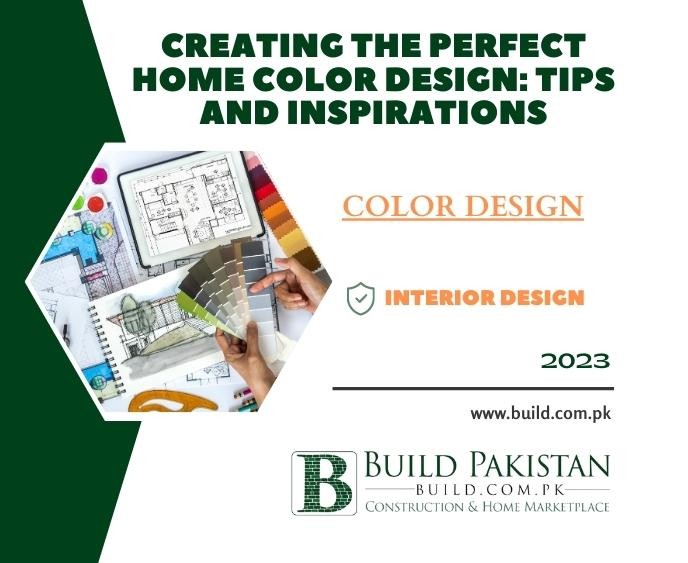Creating the Perfect Home Color Design: Tips and Inspirations

Introduction:
The color palette of your home is a fundamental aspect of
interior design that can significantly impact the overall ambiance and mood. A
well-thought-out home color design sets the tone for each room, reflects your
personalityand creates a harmonious living space. Whether you are planning a
complete home makeover or simply looking to refresh your interiors, selecting
the right colors can make a world of difference. In this blog, we will explore
tips and inspirations to help you create the perfect home color design that
suits your style and enhances the beauty of your living spaces.
Understand the Role of Colors
Colors have the power to evoke emotions and affect our
psychological well-being. Before deciding on a home color design, it's essential
to understand the different roles colors play:
Neutral Colors:
Neutrals like white, beige, gray, and taupe
create a calming and versatile backdrop, allowing you to easily incorporate
other colors and decorative elements.
Warm Colors:
Hues such as red, orange, and yellow add
coziness and energy to a room, making them ideal for gathering spaces like
living rooms and dining areas.
Cool Colors:
Shades like blue, green, and purple exude a
sense of tranquility and relaxation making them suitable for bedrooms and
bathrooms.
Choose a Cohesive Color Scheme
Create a cohesive flow throughout your home by selecting a
color scheme that connects different spaces. You can achieve this by choosing a
primary color and then using its various shades and complementary colors as
accents in different rooms. This will create a sense of harmony and unity
within your home.
Consider Natural Light
The amount of natural light a room receives can significantly
impact how colors appear. Rooms with ample sunlight can handle darker and
bolder colors, while rooms with limited natural light may benefit from lighter
hues to create an airy and spacious feel.
Accent Walls
Incorporate accent walls to add depth and visual interest to
a room. Choose a bold color or a patterned wallpaper for one wall to create a
focal point that complements the overall color scheme
Play with Textures
Consider incorporating various textures in your color design,
such as woven fabrics, textured wallpaper or natural materials like wood and
stone. Textures add depth and dimension to a room, making it more visually
appealing.
Experiment with Color Psychology
Colors have psychological associations that can influence
emotions and behaviors. For example, blue is often associated with calmness and
productivity, while yellow can evoke feelings of happiness and positivity. Keep
color psychology in mind while selecting colors for different rooms, aiming to
create environments that align with their intended purposes.
Test Samples Before Committing
Before painting an entire room test paint samples on the
walls to see how the colors look in different lighting conditions. This will
help you avoid unpleasant surprises and ensure you are satisfied with the
chosen colors.
Home Color Design Inspirations
Classic Elegance:
Opt for a timeless and sophisticated color
scheme with soft neutrals like beige, cream, and pale gray. Add touches of
elegance with metallic accents like gold or silver.
Coastal Retreat:
Create a coastal-inspired home with soft
blues, sandy beiges, and crisp whites. Integrate natural elements like rattan
furniture and seashell decor for a serene coastal ambiance.
Modern Eclectic:
Embrace a mix of vibrant colors, geometric
patterns, and eclectic artwork to create a vibrant and modern home design Play
with bold hues like teal, mustard, and coral to add personality to your space.
Earthy Warmth:
Use warm earthy tones like terracotta, burnt
orange, and olive green to bring warmth and comfort to your home. Pair these
colors with natural materials like wood and jute for a cozy and inviting
atmosphere.
Conclusion:
Designing the perfect home color scheme requires careful
consideration of various elements, from the desired ambiance to the natural
lighting conditions of each room. By understanding the role of colors, choosing
a cohesive color scheme and experimenting with textures, you can create a home
color design that reflects your style and enhances the beauty of your living
spaces. Draw inspiration from different color palettes and explore the world of
color psychology to curate a home that feels both inviting and uniquely yours.
Remember, the power of color lies in its ability to transform spaces and evoke
emotions, making it an essential aspect of interior design that should not be
overlooked.









